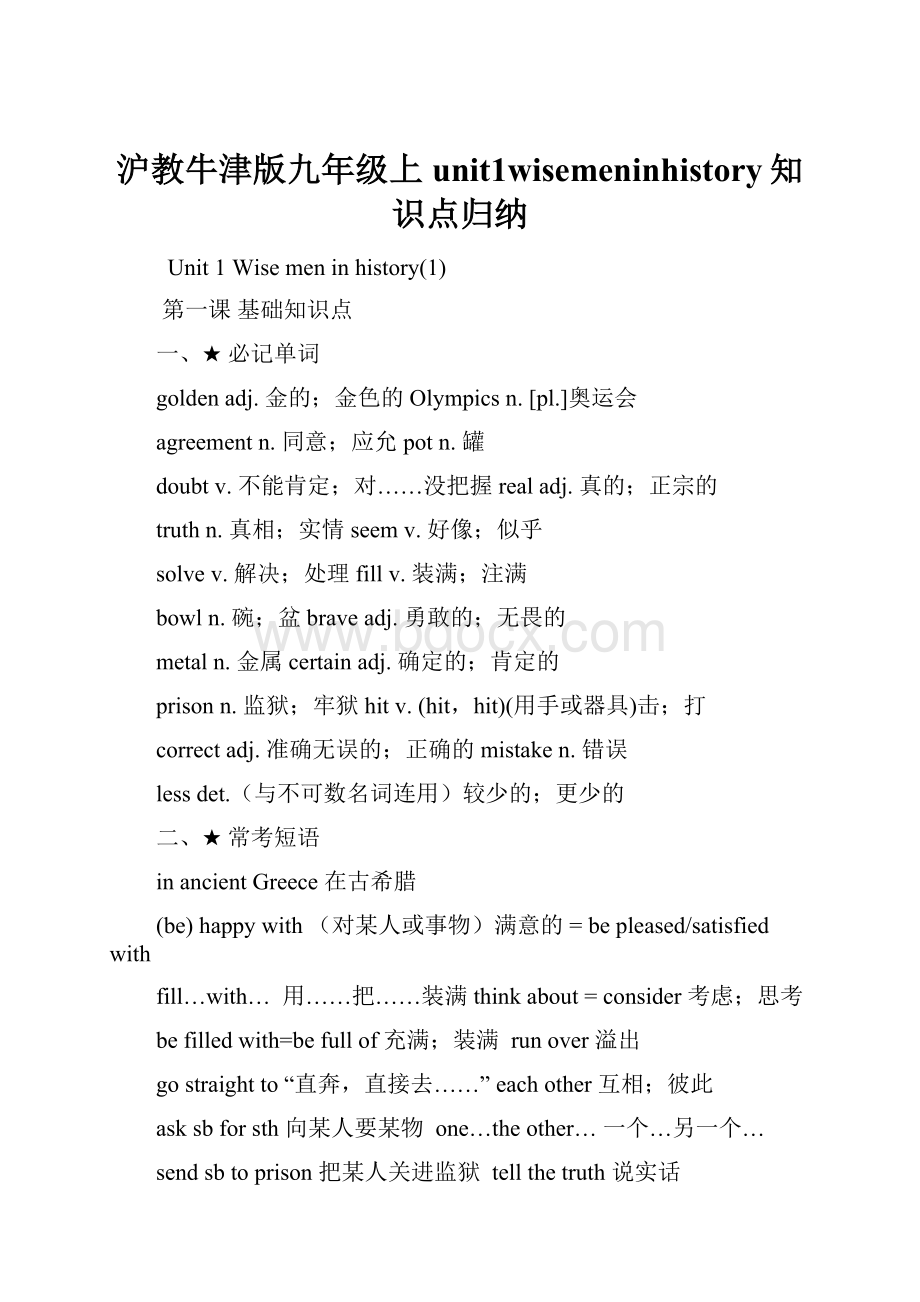沪教牛津版九年级上unit1wisemeninhistory知识点归纳.docx
《沪教牛津版九年级上unit1wisemeninhistory知识点归纳.docx》由会员分享,可在线阅读,更多相关《沪教牛津版九年级上unit1wisemeninhistory知识点归纳.docx(19页珍藏版)》请在冰豆网上搜索。

沪教牛津版九年级上unit1wisemeninhistory知识点归纳
Unit1Wisemeninhistory
(1)
第一课基础知识点
一、★必记单词
goldenadj.金的;金色的Olympicsn.[pl.]奥运会
agreementn.同意;应允potn.罐
doubtv.不能肯定;对……没把握realadj.真的;正宗的
truthn.真相;实情seemv.好像;似乎
solvev.解决;处理fillv.装满;注满
bowln.碗;盆braveadj.勇敢的;无畏的
metaln.金属certainadj.确定的;肯定的
prisonn.监狱;牢狱hitv.(hit,hit)(用手或器具)击;打
correctadj.准确无误的;正确的mistaken.错误
lessdet.(与不可数名词连用)较少的;更少的
二、★常考短语
inancientGreece在古希腊
(be)happywith (对某人或事物)满意的=bepleased/satisfiedwith
fill…with… 用……把……装满thinkabout=consider考虑;思考
befilledwith=befullof充满;装满runover溢出
gostraightto“直奔,直接去……”eachother互相;彼此
asksbforsth向某人要某物one…theother…一个…另一个…
sendsbtoprison把某人关进监狱tellthetruth说实话
makesure 确保;设法保证somethingelse别的东西
both…and………和……都……payattentionto(to为介词)
leavesbalone不打扰某人;不惊动某人(leavemealone)
not…anylonger=nolongersendsthtosb-=send把某物寄/送给某人
bemadeof+看得见的原材料由……制成cut……up切割开;切碎
bemadefrom+看不见的原材料由……制成take……off领走;带走;使……离开
bemadeby+sb.被某人制成atthebeginningof在……的开头
三、常用句型:
…asonecan尽可能,相当于as……aspossible
sb.in/on+the+身体部位,打某人的某个部位(身体部位较硬或凸起,用on;部位较软或下凹,用in)
ofthe+adj最高级+可数名词复数最……的……之一
todosth.试图做某事,尽力做某事isbelievedthat……
6.be(not)allowedtodosth(不)被允许做某事
……todosth让/使……做某事todosth开始做某事
四、辨析
1.辨析:
win与beat
Win(won,won)
及物动词
宾语表示比赛、奖品、战争、荣誉等名词
Hewontheargument.
不及物动词
意为“获胜”
Whowonhewon.
Beat(beat,beaten)
及物动词
意为“击败”宾语为比赛或竞争对象
ChinabeattheUnitedStatesbytwotoone.
不及物动词
意为“(风雨)等拍打;(心脏)跳动”
Ifeltmyheartbeatingfaster.
2.辨析:
else与other
else
副词
用于不定代词(anything,something,nothing等)、疑问词(what,who,where)后
other
形容词或代词
做形容词时,放在名词前作定语;作代词时,常与定冠词the连用,构成one…theother,表示(两者中)一个……另外一个
Eg:
whoelsewillgowithusWherearetheotherstudents
Ihavetwopens,oneisred,andtheotherisblue.
3.辨析:
discover与invent
这两个词都用作及物动词,都指人们首先见到新鲜事物,但含义不同。
discover
发现
指发现或偶然发现原本存在的,但一直未被认识或不为人知的东西
invent
发明
指创造发明出新的、原来并不存在的东西
Recentlytheydiscoveredgold.最近他们发现了黄金。
Edisoninventedtheelectriclightbulb.爱迪生发明了电灯泡。
4.辨析:
atfirst与firstofall
atfirst
起初;当初
相当于atthebeginning,与后来发生的事相对照,其反义词组为atlast(最后,终于)
firstofall
首先,第一
相当于first,表示顺序,是时间上或一系列行动的开始,后面往往接next,then等
AtfirstIdidn'twanttogo,butIsoonchangedmymind.
起初我不想去,可是不久我改变了主意。
Firstofall,openthewindows,thenturnoffthegas,andifnecessary,callanambulance.
首先,打开窗子,然后关掉煤气,如果需要,叫一辆救护车。
5.辨析:
however与but
二者都有“然而,但是”的意思,其区别如下:
however
然而;不过
比较正式,可以放在分句之首、之中或之尾;其前面或后面要用逗号隔开,如在句中,其前后都要加逗号。
but
但是
转折的意味比however要强,从语序上看,but总是置于引出的分句之首。
It'sraininghard,however,they'restillworkinginthefield.
雨下得很大,然而他们仍然在地里干活。
I'dliketogoswimmingwithyou,butIhavetotidythegardennow.
我很想和你一起去游泳,但是我现在必须整理花园。
6.辨析:
real与true
real
强调客观存在,并非想象的或虚构的,即某物外表与实质之间有一致性
ChristmasFatherisn'tarealperson.
圣诞老人不是真实的人物。
true
强调事实与实际情况相符,并非杜撰、捏造的,符合一定标准、一定模式
Isittruethatheisdead他死了,是真的吗
7..辨析:
bemadeof与bemadefrom
bemadeof
看得出原材料
Thetableismadeofwood.这张桌子是由木头做成的
bemadefrom
看不出原材料
Thewineismadefromgrain.这酒是用粮食酿造的。
【中考﹒链接】
Booksaremadepaperwhilepaperismainlymade_____wood.
A.of;ofB.from;fromC.of;fromD.from;of
8.辨析:
not……anylonger/nolonger与not…anymore/nomore
not……anylonger/nolonger:
多指时间上不再延续,与之搭配的词多为延续性动词。
not…anymore/nomore侧重程度或在数量上不再增加
Idon’twanttostayhereanymore.
Thepoorboywon’tcomeanymore./thepoorboywillnomorecome.
9.辨析:
seesbdoingsth与seesbdosth
seesbdoingsth
看到某人正在做某事
Isawhercrosstheroad.(穿过了马路)
seesbdosth
看到某人做了某事,指看到动作发生的全过程或看到动作经常发生
Isawhercrossingtheroad(正在过马路)
与此相同的词(组):
watch,hear,notice,observe,lookat,listento
10.辨析:
thenextday与nextday
thenextday
第二天,常与一般过去式连用
Thenextday,allthebooksweresoldout.
nextday
明天,常与一般将来时连用
Nextday,Iwillgoshoppingwithhim.
11.辨析:
dress,wear,puton,haveon与in
dress
给(某人)穿衣服
表动作
后接sb./oneself作宾语shedressedhimselfquickly.
wear
穿着
表状态
后接衣服、首饰、鞋帽等名词wewearuniformsatschool.
puton
穿上
表动作
后接衣服,鞋帽等名词pleaseputonyourhat.
haveon
穿着
表状态
接衣服类名词,宾语是代词时,放中间,不用进行时Ihaveonapairofjeanstoday.
in
穿着
表状态
后接表颜色或衣服的名词he’salwaysingreenshoes.
助记:
穿戴动作puton,状态wear已穿上;dress接人作宾语,in后颜色或衣裳
12.辨析:
usedtodosth,beusedtodosth,与beusedtodoingsth
Usedtodosth.
过去常常做某事
Iusedtobeafraidofthedark.
Beusedtodosth
被用来做某事
Theroomisusedtohaveameeting
be/getusedtodoingsth
习惯于做某事
Youwillsoonbe/getusedtolivinginthecity.
13.辨析:
throughoveracross
Through
穿过;通过
指从空间内部穿过
Thetrainpassedthroughatunnel.
over
越过
物体上方跨过,无接触面
Hejumpedoverthewall.
across
穿过;横过
物体表面的一边到另一边
Wewentacrosstheroad.
14.辨析:
findfindoutlookfor
find
强调“是否找到”这一结果
Haveyoufoundyourbjike
Findout
(找出,查明)经过一番努力找到事情的真相
let'sfindoutwhentheplanewilltakeoff
Lookfor
后接寻找的对象,强调寻找这一过程
Thegirlislookingforherbook.
★解析:
1.Atfirst,hewasveryhappywithit.
behappywithsb./sth意为“对某人或事物满意的”,
=bepleased/satisfiedwithsb./sth
Histeacherishappywithhim.他的老师对他很满意。
SheishappywithwhatI'vedone.她对我做的很满意。
2.Later,however,hebegantodoubtthatitwasarealgoldencrown.
(1)begintodosth.意为“开始做某事”,同义词组为begindoingsth.。
WhencanIbegintowork我什么时候能开始工作呢
WhenIgotthere,thesingerhadalreadybegunsinging.
当我到那儿时,歌手已经开始唱歌了。
(2)doubt此处用作及物动词,意为“不能肯定,对……无把握”。
Hedoubtsthetruthofthenews.他怀疑那件新闻的真实性。
Idon'tdoubtthatshe'llcome.她一定来,我不怀疑。
【拓展】
doubt用作不及物动词,意为“怀疑”,其后常接of,about。
Shedoubtsabouteverything.她对一切都怀疑。
Hedoubtsofhissuccess.他怀疑他能否成功。
doubt后接宾语从句时,名词从句用if/whether引导,名词从句也可用that引导。
Idoubtif/whethershewillkeepherword.我怀疑她是否会遵守诺言。
Idon'tdoubtthatwewillwin.我们会获胜是没有疑问的
③做名词,意为“怀疑”,固定短语:
beindoubt“不肯定,不确定”
Nodoubt无疑,很可能”without/beyonddoubt毫无疑问,的确
3.“Isitmadecompletelyofgold”hewondered.
wonder想知道,相当于wanttoknow
①后接疑问词引导的宾语从句,从句使用陈述语序。
Iwonderwhosheis.
②后接if/whether引导的宾语从句,表示委婉的请求或疑问。
Iwonderifyouwouldmindgivingmeahand.
③后接“疑问词+不定式”结构Iamjustwonderinghowtodoit.
拓展:
wonder做动词,还可意为“感到惊异”,可与at/about连用Idon’twonderathiswords.
Wonder作为可数名词,意为“奇迹;奇观”
4.“Thisproblemseemsdifficulttosolve.WhatshouldIdo”thoughtArchimedes.
(1)seem用作连系动词,意为“似乎,好像”,后常接形容词作表语,可以和seemtobe和Itseems/seemedthat…相互转换。
Heseemsveryangry.=Heseemstobeveryangry.他好像非常生气。
用作实意动词,可接todosthHeseemstosing.他似乎在唱歌。
(2)solvevtsolutionnthesolution(s)to,意为……的解决办法
5.Archimedeswasstillthinkingaboutthisproblemashefilledhisbathwithwater.
fill…with… 意为“用……把……装满”,其被动语态形式为befilledwith,相当于befullof
6.weigh“称……重量;重”其名词形式为weight
Pleaseweighthebananasforme./sheweighs60kilos./it’sabout76kilosinweight.
Somegoldofthesameweightthesame…as…与…相同的(……)
Iboughtthesamecarasyours./thisbowlisthesameasthatone.
7.…soI'mcertainthatit'snotcompletelymadeofgold.
certain用作形容词,意为“确定的,肯定的”。
常用结构:
becertain+从句一定……
I'mnotcertainwherehelives.我不敢肯定他住在哪儿。
becertaintodosth.肯定要做某事
Heiscertaintofinishthetaskontime.他肯定会按时完成任务。
becertainof/aboutsth.对……确信,有把握
We'recertainofsuccess.我们有把握成功。
becertainofdoingsth.有把握做某事
Heiscertainofwinningthematch.他确信能赢这场比赛。
8.sendsbtoprison/takesbtoprison“把……关进监狱”inprison坐牢,服刑
9.goahead开始吧其主要用法
①表示同意或允许,意为“说吧,做吧,进行吧”
②继续……吧Goahead,wearealllistening.
③表示请对方先走或先做某事,意为“你先走一步;你先请”
Yougoaheadandtellhimthatwe’recomingsoon.
10.What'swrongwithit
What'swrong(withsb./sth)是用来询问“某人发生了什么事情或某物出了什么
毛病/故障”等最常用的句型之一。
其同义句型为:
What'sthematte/troublewith...
What'swrongwithyou你怎么了(出什么事了)
11.That'swhyI'mangry.
That'swhy...意为“那就是……的原因”,why引导的是表语从句,用陈述语序。
表语从句是在句中作表语的从句,常位于连系动词be,look等的后面。
Thealarmclockdidn'tgooff.That'swhyhewaslateforschool
12.beallowedtodosth被允许做某事
allowsbtodosth允许某人做某事allowdoingsth允许做某事
Heallowssmokinghere.他允许在这里抽烟ourteacherallowedustogooutforawalk.
13.However,Helen,abravewoman,wantedtowatchhersonrun.
watchsb.dosth意为“看某人做了某事或经常做某事”,表示看见动作发生、进行
的全过程。
其中do为省略to的不定式,作宾语补足语。
Iwatchedhergooutoftheroomjustnow.刚才我看到她从房间里出来了。
注意:
Watchsb.doingsth.意为“看某人正在做某事”,表示看见动作正在进行。
其中doing为现在分词,作宾语补足语。
Hestoppedtowatchusworking.他停下来看我们干活。
【拓展】和watch用法相同的动词(组)还有see,hear,make,feel,notice,lookat等。
DidyouhearJackcallyou你听见杰克叫你了吗(动作结束)
WeoftenhearthegirlsingEnglishsongs.
我们经常挺大了那个女孩唱英文歌曲。
(动作经常发生)
Iheardthesongwindblowingwhenitwasrainingheavily.
下大雨的时候我听见狂风呼啸。
(动作正在进行)
14.Whenyouhavewrittensomething,youshouldcheckyourworktomakesurethe
spelling,grammarandpunctuationareallcorrect.
(1)makesure意为“确保,设法保证”,后可接宾语从句或of短语。
同义短语:
besure/becertain
Makesurethattheyknownothingaboutourplan.绝对不能让他们知道我们的计划。
Theyscoredanothergoalandmakesureofvictory.他们又进了一个球,这就赢定了。
(2)correct此处用作形容词(=right),意为“正确的”,其副词为correctly(正确地)。
【拓展】correct用作动词,意为“改正;纠正”correctthemistakes改正错误
12.…writewhatkindofmistakeitis…
mistake用作可数名词,意为“错误”,常用短语:
makeamistake/mistakes犯错;
bymistake错误地You'vemadeseveralgrammaticalmistakesinthecomposition.
Igotonthewrongbusbymistake.我搭错了公共汽车。
【拓展】mistake(mistook,mistaken)还可用作动词,意为“弄错,搞错”。
常用短语:
mistake…for…“把…误认为…”
Shedidn'tspeakveryclearly,soImistookwhatshesaid.
她说话不是很清楚,所以我误解了她的意思。
Heisoftenmistakenforafamousactor./weoftenmistakehimforafamousactor.
他常常被误认为是个名演员。
13.However,noonecouldfindascalelargeenough.
enough此处用作副词,意为“足够地”,修饰形容词或副词时,要放在其后。
Herunsquicklyenough.他跑得足够快。
It'swarmenoughintheroom.屋子里够暖和了。
adv/adj+enough+(for+名词/代词+)to